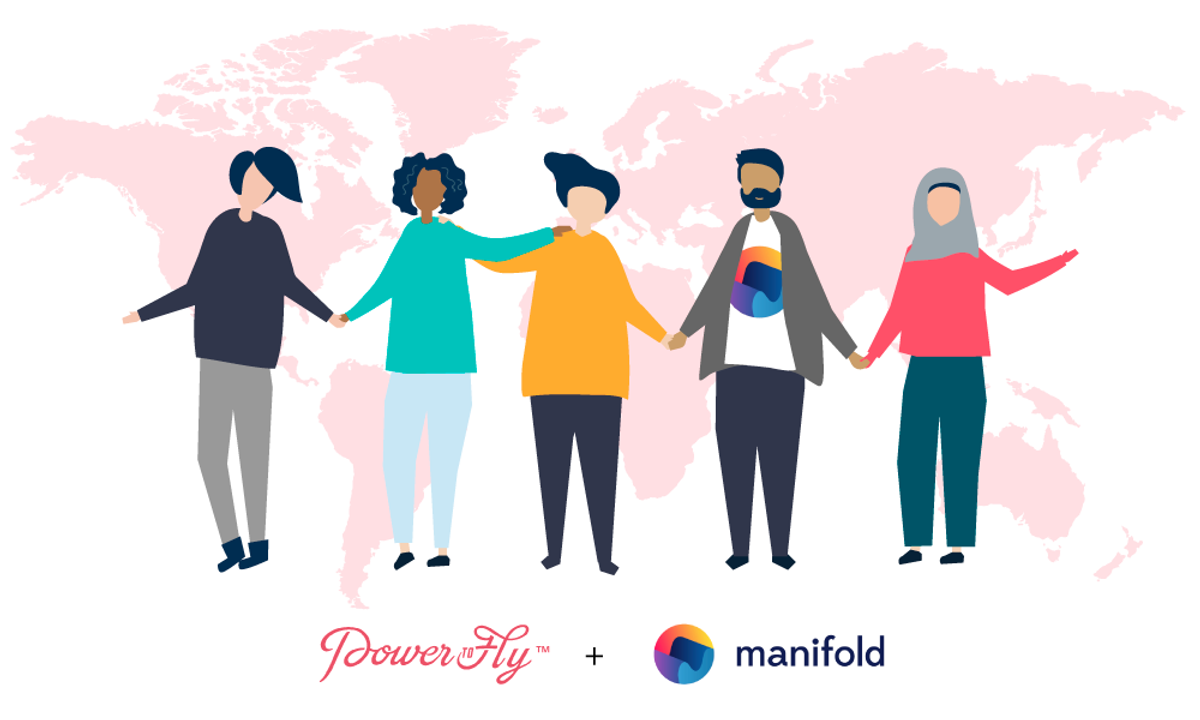Ever read a job description and felt discouraged from applying? Or received a salary offer that just felt unfair? There are a lot of companies that show gender bias in job descriptions and offer non-competitive salaries... without even realizing they're doing it.
That's why remote-reliant cloud-computing company Manifold goes to such great lengths to ensure that they eliminate implicit bias from each step of their hiring process and offer fair salaries on par with industry standards (which is hugely important in tackling the gender pay gap, given that women are much more likely to accept low or unfair salaries than men).
We sat down with Gary Poster, VP of Engineering at Manifold, to learn more about Manifold's commitment to eliminating gender bias, as well as their hiring process and work culture.
Spoiler alert, Gary emphasizes some of our top values like empathy, employee engagement, and product excellence to achieve a productive work environment.
Headquartered in Canada, Manifold is on a mission to help developers break free from the closed ecosystems of the cloud and into a more open, standards-based community of services and APIs. They offer awesome benefits like flexible working hours and $2,000 towards professional development to help their team thrive (and even give back to the communities they love)!
Read on to learn more about the culture at Manifold and what you can do to join their team!
1. What traits are you looking for in your next team member?
We have several positions open right now, including a Customer Success Lead, a couple of frontend engineers, and a backend engineer or two. Each of those have their own specifics, of course. More generally, for all of our positions, we look for empathy, good written and oral communication skills, and a growth mindset.
For the customer success position, a key characteristic we're looking for is experience supporting developers. For backend, we're looking for Go, and ideally GraphQL experience. For the frontend, React is the key, and if you happen to have experience with Stencil or d3 in addition, that would be amazing!
2. Why do women and underrepresented talent feel they can thrive at your company?
We have a number of key positions held by women. We think that when people identify with company leaders, they will feel that opportunities are real.
From a cultural perspective, we work hard to make Manifold an environment that helps everyone thrive. Emphasizing empathy helps with that. We also coach growth, feedback, collaboration, and excellence, and we have the people and programs to back it up. In particular, we have had a number of internal lunch-and-learns that supported some of these topics, ranging from inclusion to psychological safety. We have a group that chats in Slack and sometimes in meetings about inclusion in our culture. These have all led to small but welcoming changes, like many of us specifying our pronouns in our Slack profiles.
Most importantly, we believe that integrating diverse ideas and perspectives leads to the best teams and the best solutions. We want people to have different ideas, to feel that they are welcomed, to empathize with others, and to feel that they are included, aligned, and committed to the results. That's hard work, and it holds us all to a high standard, but we believe it's the best way forward for innovation.
3. What does the interview process at your company look like and how long does it usually take?
Our process is a screening call, a short questionnaire, a 3-4 hour homework project, and three interviews with potential peers. We wrap up with a call with our CEO and figuring out the nuts and bolts of getting you a contract. We can do it in a week, scheduling all three interviews in a single day, but it's more typical for candidates to want to find time in their own schedule, and do it over the span of two or three weeks.
The process typically goes like this.
We usually start with a phone call with your hiring manager or the person otherwise leading the search for your position--a "screen," but 30-45 minutes, to let you ask questions too. We often also try to set ballpark salary expectations in this call. When possible, we like using the Gitlab salary calculators (see their backend and frontend developer calculators, for instance) to set expectations in an open way that tries to reduce bias.
If you and Manifold both want to proceed after the call, we collect two things from you over the next several days. For one, we ask you to fill out a questionnaire, containing seven or eight questions about your experience. For the other, we typically ask you to do some kind of homework. For developers, this is a timed four hour project in Go or React. For the customer success position, we have a scenario for you to work through.
Once we have these two items, we share them with several people who would be your peers in the organization, and ask them for an evaluation. To again try to reduce bias, we generally evaluate our homework assignments and questionnaires anonymously--without names or resumes, and using gender-neutral pronouns. We only tell reviewers how many years of experience you have. We care a lot about both the questionnaire and the homework, and have decided that candidates are not a fit right now based on one or both of them.
If we decide to proceed after the review, we schedule three hour-long interviews, each with you and two people from Manifold, for a total of six people. You'll typically have a chance to meet people who have jobs like yours, as well as jobs adjacent to yours. Interviewers will have seen your resume, questionnaire, and homework. Conversations will be about all of them, as well as your own questions.
If we all want to proceed, we're in the home stretch! We'll figure out the details about your salary and contract, have you chat with our CEO, and hope to have you signing a contract quickly!
4. What's a hot tip about your interview process that PowerToFly members can know?
I'll give three. First, come to all your calls with questions! They help us both evaluate one another better.
Second, the questionnaire is just as important to reviewers as the homework. You don't need to write a novel or overthink it, but we're looking at your culture fit, your interests and passion, and your ability to communicate in writing. Four or five sentences per answer is a good middle ground, in our experience.
Lastly, if you are a developer, when you are doing your homework, write a good PR, as if you were communicating with peers on your team. Make it concise, clear, and friendly. Quickly summarize what you've done, why, and the key points you have questions about.
5. Can you relay an encouraging anecdote about someone who was hired by your company who may have thought it was a long shot, or they applied multiple times?
A few months back, one person took our junior-level React homework assignment and didn't do quite well enough. After we told them, rather than stop the process, they decided to take two weeks and dig deep into React with self-study and practice, and then take our advanced React homework. They did well in the advanced homework, we were impressed during our interviews, and we hired them. We no longer have two available tests, but in our screening calls we do sometimes explore the possibility of people studying React for a week or two before taking our homework, if that's interesting to them.
6. What do you love most about working at your company?
We all care about growing ourselves, our culture, and our product's excellence, and I think it shows. Even within a distributed team, we care about each other. We bring our full selves to the team, and put in the extra touches inside and out that come from pride, passion, and empathy for our peers and our customers.
7. What is your favorite thing about PowerToFly and why is it valuable to your organization?
It targets a group we're highly interested in: gender diverse candidates who want remote technology jobs. Also, the people running it seem to be really nice!
We're a pretty small company, but we've gotten several hires through PowerToFly, including key positions. We also really appreciate PowerToFly's active approach to outreach, beyond simply being a job board.
8. What can other recruiters do to be more successful when looking for diverse talent?
I'm confident that there's more to be done, but based on our own experiences, there have been a few things that have worked well for us.
When we are hiring, we use products, companies and recruiters that help us target diverse candidates--like PowerToFly! We have had a lot of success from simple searches and requests. Showing up is a good start.
Happy employees bring in their own network to candidate searches, and happy employees from underrepresented groups have helped bring in more diverse talent.
We care about our job descriptions and work to make them gender neutral with tools like textio.
As I mentioned before, to try to avoid bias, we evaluate our homework assignments and questionnaires anonymously--without names or resumes, and using gender-neutral pronouns--and clarify that process to candidates.
We use tools like GitLab's salary calculators (backend and frontend) to try and have a fair baseline price, reducing bias and increasing transparency.
During the hiring process, we collect feedback privately before sharing it with one another to try and prevent groupthink.
9. What do you think that candidates find most appealing about the opportunities at your company?
Many folks like the idea of helping developers create faster and more powerfully. Our product's story--an independent marketplace of developer tools that can build win-win relationships between customers, providers, and platforms--can really excite people.
We've pointed out a number of our blog posts about our remote culture to prospective candidates that have resonated.
Also, working remotely on a strong, distributed team is something that appeals to many people who want to have more freedom in where they live, and commute less.
Finally, we are using newer technology like Go, React, Kubernetes, and web components. And we're operating with leading operational and organizational practices, such as those from the DevOps movement. Some candidates are excited to use and learn these tools and skills.
10. What are the top skills/character traits that make you so successful in your work?
We strive, and I personally strive, for empathy, a growth mindset, excellent communication, openness and transparency, the pursuit of excellence, and a lean/Agile/DevOps mindset. I often summarize all this as trying to balance alignment and autonomy while pursuing growth. I wrote a blog post about the principles I try to follow and grow, if you'd like to read more!




